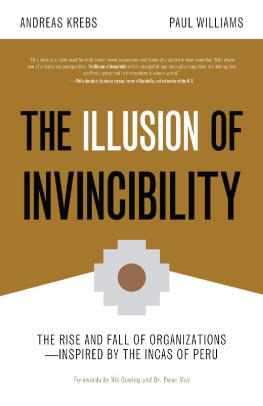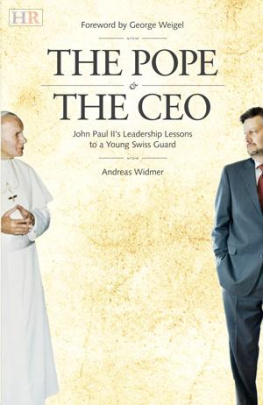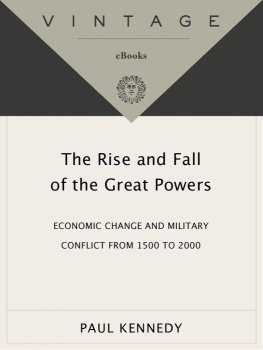The Illusion of
Invincibility
Andreas Krebs / Paul Williams
The Illusion of
Invincibility
The Rise and Fall of Organizations
Inspired by the Incas of Peru
Forewords by Nik Gowing and Dr. Peter May
Copyright 2019 Andreas Krebs and Paul Williams.
Published by Mango Publishing Group, a division of Mango Media Inc.
Originally published by GABAL Verlag GmbH, Offenbach, Germany under the title:
Die Illusion der UnbesiegbarkeitWarum Manager nicht klger sind als die Incas vor 500 Jahren
Translated from German by Christopher McGinty (www.bgbn.de) and Paul Williams
Cover design: Martin Zech Design, Bremen
Set and Layout: The Manufacturing Office, Hamburg
Cover Photos of the Authors: Birgit Schmuck/Michael Kranz
Mango is an active supporter of authors rights to free speech and artistic expression in their books. The purpose of copyright is to encourage authors to produce exceptional works that enrich our culture and our open society.
Uploading or distributing photos, scans or any content from this book without prior permission is theft of the authors intellectual property. Please honor the authors work as you would your own. Thank you in advance for respecting our authors rights.
For permission requests, please contact the publisher at:
Mango Publishing Group
2850 S Douglas Road, 2nd Floor
Coral Gables, FL 33134 USA
For special orders, quantity sales, course adoptions and corporate sales, please email the publisher at or +1.800.509.4887.
The Illusion of Invincibility: The Rise and Fall of Organizations Inspired by the Incas of Peru
Library of Congress Cataloging-in-Publication number: 2019944127
ISBN: (print) 978-1-64250-143-8, (ebook) 978-1-64250-144-5
BISAC category code BUSINESS & ECONOMICS / Leadership
Printed in the United States of America
Table of Contents
Founder and director of Thinking the Unthinkable and main presenter, BBC World News 19962014.
Business and leadership have always faced immense vulnerabilities. Enterprises begin with great energy and innovative ideas that develop through the start-up period and seed funding. Commitment and determination are vital to ensuring early success. A strong sense of self-belief and invincibility fuels a conviction that failure is not even possible.
Then comes the scaling up, and hopefully the sustaining of success. Failing to be nimble and agile, with a constant anxiety about what is being missed, has always triggered a cost. Often that price can ultimately turn out to be existential, both for brands and professional re putations.
At the start of this third decade of the twenty-first century, those pressures and that reality are sharper than ever. Business and politics are wrestling with the scale of a new disruption. It is getting deeper and wider. The timelines are shorter. Public intolerance and impatience are sharper than ever. Customers and voters alikeespecially the NEXTGENpush back against anything or anyone they d ont like.
We assume the current disruptions and challenges to all are not a blip. The often-brutal realities and lessons of history should warn us to expect this challenge to what almost everyone assumes is an automatic continuation of seventy years of stability and normality since World War II. After all, it is assumed that things and fortune will alwayson balanceg et better.
In so many ways, we have been fortunate. Yet now, most leaders and those they serve are unable to grip the nature, scale, and implications of disruptions that are underway. Denial and disbelief tend to be the default, not a pragmatic embracing of unthinkables and unpa latables.
The way things have been is not the way they are and will soon be. Destabilisation and subversion of all we assume and have taken for granted are underway. Handling the new disruptions requires new skills and talents. But leaders, who largely qualified for the top by conforming, are neither skilled nor prepared for what needs to be a profound, earth-shaking change in their approach. Conformity that qualified them for the top disqualifies them from providing the leadersh ip needed.
This is why this reality check assembled by Andreas Krebs and Paul Williams is so i ntriguing.
Their comparison of twenty-first century leadership vulnerabilities with how the Inca empire first grew at an extraordinary rate to dominate South America, then imploded ignominiously, is both sobering and inspiring. As they report, there is always a logic to decline. But, inevitably, the leaders involved are blind to that logic. The Incas showed that. They never fully realized what threatened them until far too late.
Like so much in business, politics, and leadership, the impact of what you read here in The Illusion of Invincibility was catalysed by a chance set of circumstances: a corporate invitation to travel to Latin America to conduct a business workshop. The research link would not easily have come sitting in Germany. But a personal intrigue to start lifting a private veil on the realitiesboth remarkable and shockingof the Inca hegemony suddenly created a wholly different range of perceptions about the travails of being a lea der today.
These ever deeper insights from an altitude of up to 3,500 meters in the Andes energize all that is reported and analysed in this book.
For example, Nokia should have learned much from the Incas. The companys breath-taking journey from forestry and manufacturing rubber boots in Finland to being a world leader in mobile phones, then its crash into ignominy with little value in a corporate fire sale, matched the rise and fall of the Incas. Authoritarian leadership, overambition, conceit, and hubris marked the record of both. Even Jeff Bezos of Amazon concedes that, one day, the mega global e-retailer he created will fail. Probably because of blindness on that part of leadership to the fragilities created by success and inflated self-belief within one of the worlds largest cor porations.
The overarching message from the Incas for leaders is that there must be a stress test for your egos. So review urgently our approach to HR. Review also who you seek to work with and who you seek to work for you. And think early enough about who and what comes next, after you have left th e company.
It takes cunning and intellectual gymnastics to draw cogent lessons for present day leaders from the brutality, unbridled self-confidence, and uncontrolled egos of a South American empire at the height of its dominance five hundred years ago. But the analogies are sobering. It works.
So take note. And consider the relevance to how you lead.
Nik Gowing, London, UK
Leading expert on family businesses and strategic consulting for owner-led organizations.
Business people love a success story: a story of victory, of rags to riches, of making it. We are fascinated by entrepreneurial legends, no matter whether they hail from the digital or the industrial age. The path travelled from a one-man operation to the hundred-million-turnover hidden champion in one or two generations or the rise of a regional player to a global multinationalthese are exciting role models that invite and inspire imitation.
But how certain can we be about the factors that lead to such an ascent? In hindsight, the reasons for a successful development almost always appear obvious: timely reengineering, cost management, well-thought-out strategies, the right product, the power of innovationall these factors are repeatedly cited as reasons for extraordinary success. And they are correctat least at fir st glance.
Over the years, the collective wisdom of business administration has assembled a framework of knowledge upon which, in its eyes, proper and effective business should be conducted. With specialist areas such as cost management, accounting, marketing, and human resources, this framework provides the academic tools on which real-life business success is widely assumed to depend. Stick to the rules of bookkeeping, profit-making and numerous other systems of prescribed business wisdom and everything will remain on the right track. But if this is true, why do so many companies fail? Were all familiar with cases in which everything has been done exactly by the book, yet a business has still disappeared without trace. And such scenarios are not choosy: they can strike the mid-sized engineering company or the multibillion-dollar corporation just as readily as the small business around the corner. Failure happens despite adherence to the generally accep ted rules.
Next page













